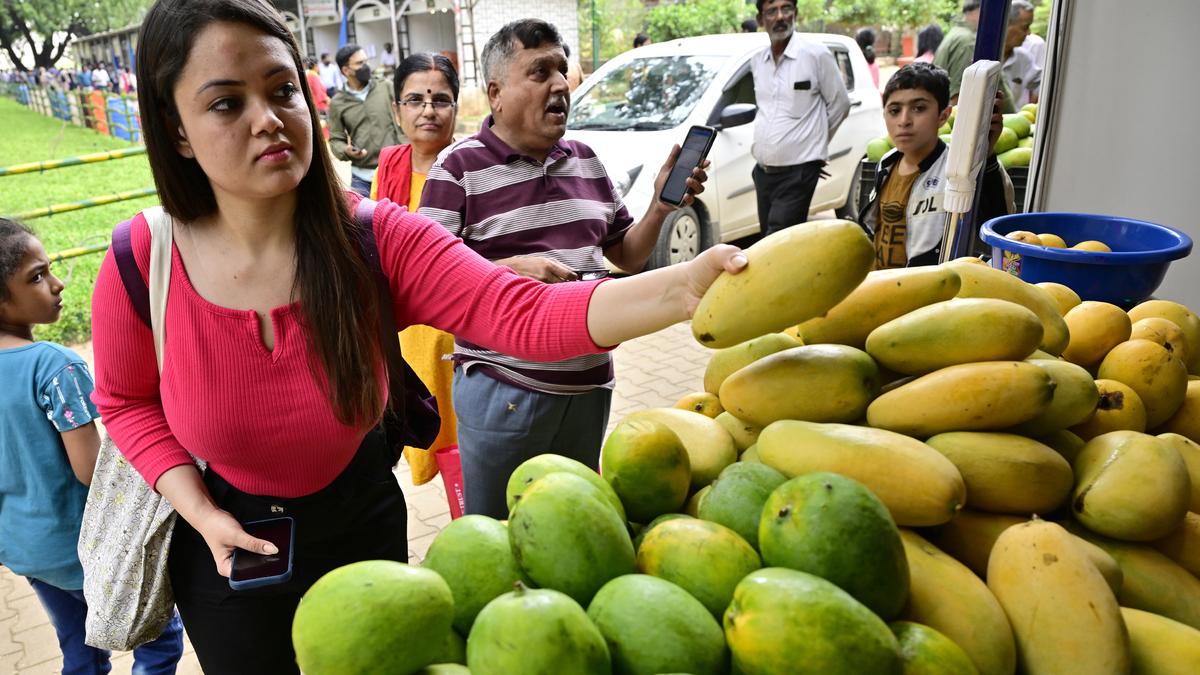
Response to mango mela at Lalbagh better than last year
The Hindu
After the dull response to the famous Mango Mela at Lalbagh last year, this year, farmers are happy as thousands of mango lovers have thronged the mela which began on May 24.
After the dull response to the famous Mango Mela at Lalbagh last year, this year, farmers are happy as thousands of mango lovers are thronging the mela which began on May 24.
According to sources in the Karnataka State Mango Development and Marketing Corporation (KSMDMC), the demand has been such that many farmers had to go back to their fields in other districts to bring more mangoes as the fruits they had brought were sold out.
“The farmers sold around 10 tonnes of mangoes on the inaugural day. After that, on May 25, they sold around 36 to 38 tonnes of mangoes and on May 26, they sold around 45 tonnes. On weekdays, they have been selling 10 to 20 tonnes of mangoes,” the source said.
“With the yield being less than usual by almost 70%, farmers are also bringing mangoes from their neighbouring fields to cater to the demand in Bengaluru,” they added.
However, farmers said while the response to the mela has been good, they are finding it difficult to make profit due to wastage.
“If we sell unripe mangoes for ₹70 a kg in Srinivasapur in Kolar district, we sell fully ripe mangoes for around ₹120-130 a kg in Lalbagh. But, when we ripen the fruits, we lose 200 kg of fruit for every tonne as many mangoes rot away in the process. While we see a good number of customers turning up this year, we have not been able to make any profits,” said Neelaturu Chinnappa Reddy, president, Kolar District Mango Growers’ Association.
The Horticulture Department has also seen a slight increase in footfall at Lalbagh since the mela started. “We have been seeing around 2,000 to 2,500 visitors on weekdays and 3,500 to 4,000 on the weekend. We also have around 5,000 walkers visit Lalbagh every morning. Most of these visitors pay a visit to the mango mela,” said G. Kusuma, Deputy Director (Lalbagh), Horticulture Department.

“Writing, in general, is a very solitary process,” says Yauvanika Chopra, Associate Director at The New India Foundation (NIF), which, earlier this year, announced the 12th edition of its NIF Book Fellowships for research and scholarship about Indian history after Independence. While authors, in general, are built for it, it can still get very lonely, says Chopra, pointing out that the fellowship’s community support is as valuable as the monetary benefits it offers. “There is a solid community of NIF fellows, trustees, language experts, jury members, all of whom are incredibly competent,” she says. “They really help make authors feel supported from manuscript to publication, so you never feel like you’re struggling through isolation.”

Several principals of government and private schools in Delhi on Tuesday said the Directorate of Education (DoE) circular from a day earlier, directing schools to conduct classes in ‘hybrid’ mode, had caused confusion regarding day-to-day operations as they did not know how many students would return to school from Wednesday and how would teachers instruct in two modes — online and in person — at once. The DoE circular on Monday had also stated that the option to “exercise online mode of education, wherever available, shall vest with the students and their guardians”. Several schoolteachers also expressed confusion regarding the DoE order. A government schoolteacher said he was unsure of how to cope with the resumption of physical classes, given that the order directing government offices to ensure that 50% of the employees work from home is still in place. On Monday, the Commission for Air Quality Management in the National Capital Region and Adjoining Areas (CAQM) had, on the orders of the Supreme Court, directed schools in Delhi-NCR to shift classes to the hybrid mode, following which the DoE had issued the circular. The court had urged the Centre’s pollution watchdog to consider restarting physical classes due to many students missing out on the mid-day meals and lacking the necessary means to attend classes online. The CAQM had, on November 20, asked schools in Delhi-NCR to shift to the online mode of teaching.









